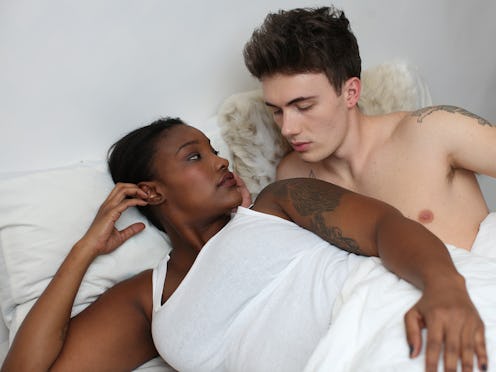
It can feel super disappointing when hitting it off with a new person to discover that, although you may have great chemistry, you also have different relationship preferences when it comes to monogamy versus non-monogamy. Take heart in this study from the journal Archives of Sexual Behavior, published earlier this month: it found that there are distinct differences in the brains of monogamous men and non-monogamous men.
Earlier non-human animal studies looking at the brains voles (a pretty cute critter in the rodent family) determined that there were differences in the density of vasopressin and dopamine receptors in more monogamous species of voles. Vasopressin is a hormone linked to sexual motivation and pair bonding, while dopamine is a neurotransmitter that helps control the brain's pleasure and reward centers, often motivating us toward more reward-fulfilling behaviors.
For the human extension of the study, which was quite small, researchers looked at the brains of 10 monogamous men and 10 non-monogamous men as they were exposed to various romantic and sexual stimuli. For the purposes of this study, monogamous men were defined as men with five or less sexual partners in their lifetime, who fantasized about people other than their partner less than once a month. Non-monogamous men were defined as men who'd had more than one partner at once, preferred having more than one partner, and/or had more than five lifetime sexual partners.
The two groups were shown three types of photos: "romantic" images (like hand-holding and people hugging), sexually explicit images (self-explanatory), and a control group of images like landscapes and scenery. There were no brain differences in the ways each group responded to either the sexual images or to the control group. But the two groups' brains responded differently when looking at the romantic images, which, according to researchers, suggested that monogamous and non-monogamous men value romance differently.
Monogamous men showed more neural activity in the reward-related centers of the brain when looking at romantic images compared with the non-monogamous ones. According to Men's Health:
"The researchers say that this might be a learned behavior, meaning that men who are monogamous may have simply have had more rewarding romantic, bonding experiences in their lives than men who are not. Such experiences might have conditioned those men to associate romantic images with feelings of pleasure, which means they may be more likely to seek out romantic monogamous relationships."
In other words, this doesn't necessarily mean we're "born" monogamously minded or non-monogamously minded. It's also worth noting that this study assumes non-monogamy and romance are mutually exclusive. It seems like there's some bias which concludes that people choose non-monogamy because they don't feel particularly romantically attached to their partners. But many folks choose non-monogamy because they do have "rewarding romantic, bonding experiences" with one partner, and would like to incorporate more of those experiences with other people.
To quote Scarlett Johansson's body-less AI character in Her: "The heart is not like a box that gets filled up; it expands in size the more you love."
Feeling satisfied in a relationship doesn't permanently kill one's motivation for continued growth. Sometimes that growth comes from incorporating other perspectives via more romantic relationships, sexual experiences, and/or other intimate connections with new people. While it's probably true that monogamously minded folks and non-monogamously minded folks have different value systems which cause them to view relationships through different lenses, it's definitely a judgement to assume that non-monogamous people don't find romance rewarding. Like most relationship preferences, the inclination toward monogamy or non-monogamy (or toward romantic versus sexual satisfaction, for that matter) is probably mostly informed by an individual's unique history and personal trauma.
Check out Bustle's 'Save The Date' and other videos on Facebook and the Bustle app across Apple TV, Roku, and Amazon Fire TV.